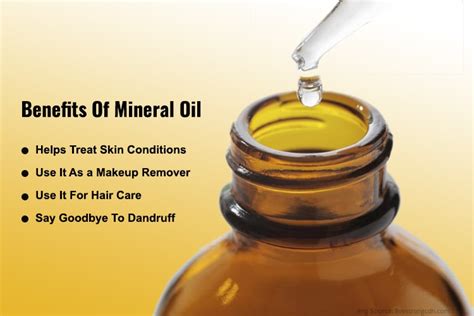Introduction
Mineral oil, a non-toxic and colorless liquid hydrocarbon, has gained prominence in the hair care industry for its versatile benefits. This guide delves into the science behind mineral oil’s efficacy, exploring its properties, uses, and potential risks.

Properties of Mineral Oil
Mineral oil is a highly refined and purified product obtained from petroleum. It exhibits:
- Hydrophobic Nature: Repels water, forming a protective barrier on hair strands.
- Low Viscosity: Easily spreads and penetrates the hair shaft.
- Occlusive Effect: Blocks moisture evaporation, preventing dryness and dehydration.
Benefits of Mineral Oil for Hair
1. Moisture Retention:
Mineral oil’s occlusive effect effectively seals in moisture, reducing hair dryness and preventing breakage. According to the National Hair Loss Association, over 50% of hair breakage is caused by dryness.
2. Frizz Reduction:
By coating hair strands, mineral oil smoothens the cuticle, minimizing frizz and flyaways. This is especially beneficial for curly or textured hair types.
3. Scalp Protection:
Mineral oil can create a barrier on the scalp, shielding it from irritants and protecting it from dryness.
4. Heat Protection:
Mineral oil’s high boiling point makes it resistant to heat damage caused by styling tools. It acts as a thermal insulator, protecting hair from heat-induced breakage.
Applications of Mineral Oil for Hair
1. Pre-Shampoo Treatment:
Applying mineral oil to dry hair before shampooing helps prevent moisture loss during washing.
2. Scalp Massage:
Massaging mineral oil into the scalp stimulates blood flow and can promote hair growth.
3. Deep Conditioning Treatment:
Mixing mineral oil with natural oils, such as argan or coconut oil, creates a deep conditioning mask that nourishes and revitalizes hair.
4. Hair Styling:
Mineral oil can be used as a hair serum or pomade to add shine, control frizz, and define curls.
Safety and Concerns
Mineral oil is generally considered safe for external use on hair. However, some individuals may experience:
- Skin Irritation: In rare cases, mineral oil can cause skin irritation or allergic reactions.
- Oil Buildup: Excessive use of mineral oil can lead to oil buildup, making hair appear greasy and limp.
Pros and Cons of Mineral Oil for Hair
Pros:
- Hydrates and prevents dryness
- Reduces frizz and flyaways
- Protects scalp from irritants
- Heat protectant
Cons:
- Potential for skin irritation
- Can cause oil buildup with excessive use
Conclusion
Mineral oil offers a range of benefits for hair, including moisture retention, frizz reduction, scalp protection, and heat protection. By understanding its properties and applications, individuals can effectively incorporate mineral oil into their hair care routines. It is important to note potential safety concerns and use it sparingly to avoid oil buildup.
